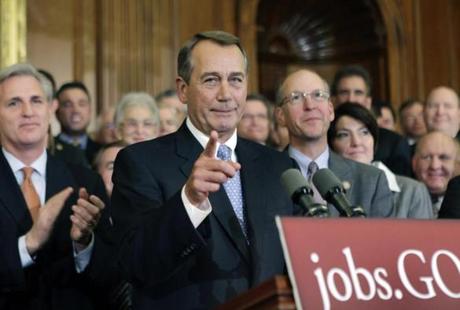Brinkmanship Works

It seems that everyone is deploring the “tactics” of the House Republicans in refusing to pass a two-month extension of the payroll tax cut and by doing so, drawing out the standoff until the last minute. Is this the way resolve a dispute? Yes, deadlines force the combatants to make concessions.
I’ve been practicing law for 22 years, and began my career believing the judicial system was an efficient and civilized method of dispute resolution.
It is civilized, generally, but extremely inefficient. in large cases lawyers will take positions on any manner of issues underlying the case, i.e., whether certain items are admissible evidence, whether certain arguments will dispose of the opponents’ case, whether a certain witness will be credible, whether the judge will rule a certain way on a pre-trial motion, and convince their clients that those positions will prevail.
Then the clients let the lawyers fight on for round after round, running up the bill, but hoping their lawyer’s predictions will turn out to be true. This plays out within deadlines. The judge sets a discovery cut-off, a deadline to challenge expert witnesses, a deadline to bring dispositive motions, and finally, if all of that fails to resolve the case, a trial date.
It is those deadlines, combined with the judge’s rulings on the parties’ contentions as the case proceeds that get the stubborn litigants to the bargaining table. When one side loses a few key decisions, and his or her case is demonstrably weakened, then he needs to start negotiating. Is this “brinkmanship?” as David Frum and other commentators, call the process? Yes but it’s also pragmatism. Parties in big-stakes disputes won’t budge until they believe the tide is turning against them. In the courtroom, that tide is the judge.
Is there a better system for getting the litigants to bridge their differences? We have mediation where an experienced neutral, usually a retired judge, makes the same preliminary decisions the judge is likely to make on evidentiary and other issues. This is conducted in private, not in a public courtroom, where the lawyers engage in posturing for the media. But it works the same way in exposing the strengths and weaknesses of the parties’ positions. Thus, mediation is really just an accelerated and private way of doing what the court would do. Nobody has developed a better way of resolving big cases.
And I don’t see that anyone in Congress has done so either. The strength and weaknesses of the two parties’ positions are now laid bare for the public. When the public (the judge in this dispute) starts to make its views known, the parties will move accordingly. This may not be efficient, but as we have seen over and over this year, the alternative, basically a private mediation conducted among party elites, (the Supercommittee, the debt limit negotiations last summer), have not worked efficiently either. This is how a highly contentious and partisan dispute will have to be resolved in Congress.
Some old-timers will bring up stories of how LBJ and Everett Dirksen met over drinks and came to terms on things. But the Republicans were a small minority in both houses at the time. Those sessions were really to work out the terms of the Republican capitulation, like Grant and Lee had at Appomattox. And as for those tales about how Tip O’Neill and Reagan knocked back beers or Irish Whiskey at the White House in the 1980’s, that, we now know from Reagan’s diary, rarely accomplished anything of substance.
Republicans had a strong hand in the early 1980’s, and there were many, many contentious fights over aid to the contras, tax cuts, etc. Reagan did not “work out” those disputes with O’Neill except in a very few cases, like the 1983 social security deal, which followed the recommendations of a presidential blue-ribbon commission.
I’m hoping the public comes down on the side of a 1 year social security tax cut. It will get Senator Reid and his colleagues back to Washington very quickly. And that’s how this process should work.

